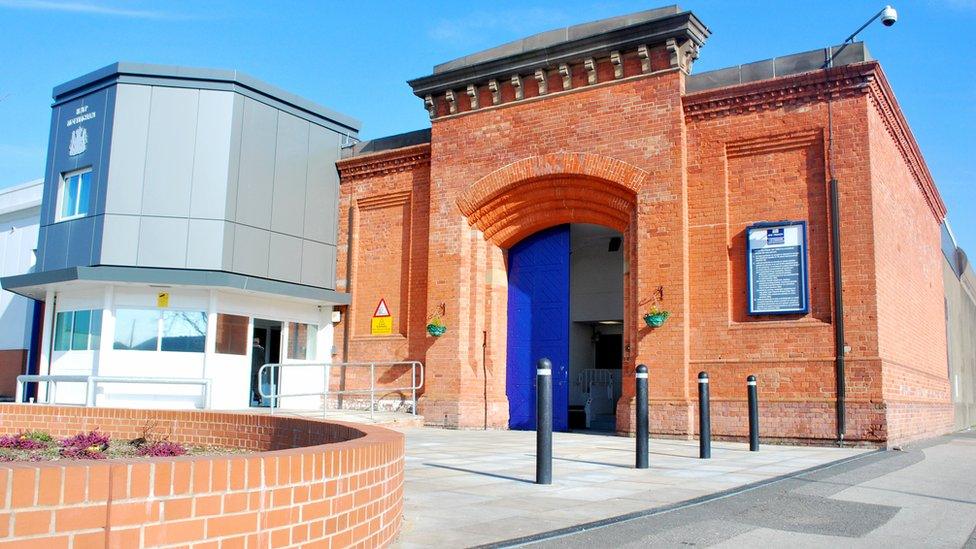HMP Nottingham prisoner died after illness 'dismissed as a cold'
- Published

Alex Braund collapsed in his cell at HMP Nottingham in March 2020
A remand prisoner at HMP Nottingham died after his concerns about struggling to breathe were dismissed as a cold, an inquest has heard.
Alex Braund, who had not been convicted of a criminal offence, first reported feeling ill three days before he died.
According to a pathologist, the 25-year-old was likely suffering with an atypical type of pneumonia.
He then had a cardiac arrest as a result of this illness, which led to his brain being starved of oxygen.
Mr Braund was taken to the Queen's Medical Centre after collapsing in his cell on the morning of 10 March 2020.
The ventilator keeping him alive was turned off later that day because too much damage had been caused to his brain while it was starved of oxygen.
'Wheezing down phone'
Mr Braund's girlfriend, Charlotte Carter, told the inquest in Nottingham that he "looked different" when she visited him on 3 March, seven days before he died.
"He looked like he had gained a lot of weight in a short amount of time, almost like a swollen appearance," she said.
She said they spoke on the phone every day, and on 7 March he phoned her twice saying he was not feeling well.
"He was wheezing down the phone as well, and struggling to breathe," said Ms Carter, describing the first phone call.
"I remember he said that he didn't feel well and couldn't breathe properly.
"I did tell him to speak to a doctor or a nurse and he said that he would."
Describing the frequency of the wheezing, she said: "It was after every sentence and he was struggling to get his words out.
"I remember it was a common occurrence in the phone call."
Ms Carter said Mr Braund had spoken to a nurse by the time he telephoned her a second time that day.
The coroner, Laurinda Bower, asked Ms Carter what the nurse had told him.
Ms Carter replied: "That it was just a cold, but we both thought it wasn't."
She said Mr Braund was worried despite not being the type of person who normally went to the doctor.
"He said he was really worried and he really didn't feel well," she said. "I remember he said that to me a few times."
'People were dismissing it'
She said Mr Braund's wheezing progressively got worse over the next few days, and he phoned her "multiple times" on 9 March - the day before he died.
"As the day went by he rang me more and more saying how he didn't feel well at all," she said.
He also called her at about 05:00 GMT on 10 March, which she said was "weird, because usually he's asleep at that time".
The coroner asked Ms Carter why he was calling her.
She replied: "Because he was scared and couldn't breathe, and he was pressing the buzzer and people were dismissing it, saying it was a cold when it was clearly not a cold.
"He sounded really worried, almost as if he was having a panic attack."
Cell mate raised alarm
The inquest is being held with a jury and is expected to take more than a week.
Giving a brief outline of the facts, the coroner said Mr Braund had been on remand at the prison since 13 February 2020 and had no known medical issues, other than a minor problem with his shoulder.
She said Nottinghamshire Healthcare NHS Foundation Trust was responsible for dealing with minor healthcare matters so that prisoners did not have to leave the prison.
However, there is no on-site hospital at the prison, so if prisoners do require hospital attention they should be transferred accordingly.
She said a nurse attended to Mr Braund on the evening of 9 March, found he had vomited, was struggling to breathe, and had chest pain.
His cell bell was then activated at about 05:30 on 10 March, but there is "dispute" about what then happened, and this is expected to be examined during the inquest.
His cell mate then activated the bell shortly before 07:00, as Mr Braund had collapsed and hit his head.
The inquest continues.

Follow BBC East Midlands on Facebook, external, on Twitter, external, or on Instagram, external. Send your story ideas to eastmidsnews@bbc.co.uk, external.
Related topics
- Published11 March 2020
